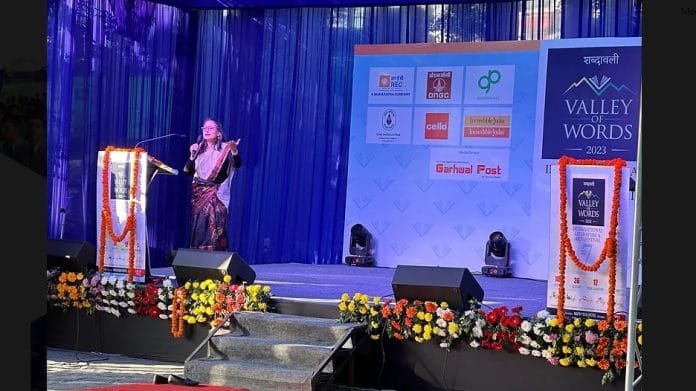New Delhi: The exhibition at the seventh edition of the Dehradun-based literature festival Valley of Words (VoW) was Evam Vadati Pustakam (So Says the Book), focused on the importance of manuscripts and the need to preserve and digitalise them.
The title of the exhibition is from a verse found at the end of the old Prakrit (later Sanskrit manuscripts) which appeals for its protection from oil, water and loose binding, and also from unappreciative readers.
The exhibition featured a selection of digitised South Asian manuscripts taken from national and international archives in tracing how writing cultures in South Asia developed and the different scripts evolved.
At the VoW Festival from 16-17 December, the showcase exhibition included various manuscripts written on copper plates, brass, dyed and gilded paper.
One such manuscript on display was a 17th-18th century Jain map on cosmology — a map of Jambudvipa, which according to the Jain model of the universe forms part of Manushya Loka, inhabited by human beings and animals with five senses.
Another was a translation of the Mahabharata which Emperor Akbar had commissioned to a team of Sanskrit and Farsi scholars in 1582.
The panel discussion on Evam Vadati Pustakam had distinguished speakers including Shyam Saran, Sudha Gopalakrishnan, Abhinav Kumar, and Lokesh Ohri coming together for an insightful session on the role of manuscripts in shaping the fabric of society.
The panelists agreed on the importance of digitising them for open-access availability in libraries.
Panelists also urged governmental support in retrieving physical copies of Indian manuscripts to study them under an Indian lens.
They also highlighted the many physical constraints and threats looming over pivotal manuscripts in terms of their survival.
Abhinav Kumar said: “India possesses its own da Vincis and Kants… the Kashmiri scholar Abhinavagupta stands as a testament to the depth of intellectual prowess residing within our borders.”
Getting hold of manuscripts would also help us establish credibility in terms of scientific and philosophical theories that have Indian origins, panelists felt.
Sudha Gopalakrishnan spoke about the diversity and knowledge of these manuscripts – from spirit-making recipes to medicinal remedies that were once essential to Indian culture but now are unknown.
Shyam Saran talked about several Indian manuscripts that were taken to Tibet by Indian monks to safeguard them; it was much later that the Dalai Lama got them back to India. She added that Chinese monks in Tibet translated 30 volumes of Sanskrit text for preservation only three years ago.
Panelists said the preservation of manuscripts, with the help of the government, should be considered a heritage project.






